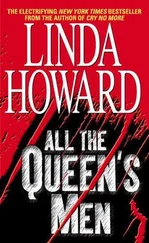He had also been a lawyer for the American Electric. He had, I learned, been let out not long before Irwin came in. It did not sound too promising, but one more dead end wouldn't matter. There had been plenty of dead ends in the six or eight months I had been on the job.
But this was not a dead end. There was Miss Lily Mae Littlepaugh, whom, after five weeks, I tracked down to a dark, foul, fox-smelling lair in a rooming house on the edge of the slums, in Memphis. She was a gaunt old woman, wearing black spotted and stained with old food, almost past the pretense of gentility, blinking slowly at me from weak red eyes set in the age-crusted face, sitting there in the near-dark room, exuding her old-fox smell, which mixed with the smell of oriental incense and candle wax. There were holy pictures on the walls on every spare space, and in one corner of the room, on a little table, a sort of shrine, with a curtain of faded wine-colored velvet hanging above it, and inside not a Madonna or crucifix as you would expect from the other pictures, but a big image made of felt and mounted on a board which I at first took to be a sunflower pincushion swollen to an impractical size, but then realized was an image of the sun and its rays, The Life-Giver. And in that room. Before it, on the table, a candle burned fatly as though fed not merely from wax but from the substance of the greasy air.
In the middle of the room was a table with a wine-colored velvet cover, and on the table a dish of poisonously colored hard candies, a glass of water, and a couple of long narrow horns or trumpets apparently made of pewter. I sat well back from the table. On the other side, Miss Littlepaugh studied me from the red eyes, then said, in a voice surprisingly strong, "Shall we begin?"
She continued to study me, then said, half as though to herself. "If Mrs. Dalzell sent you, I reckon–"
"She sent me." She had sent me. It had cost me twenty-five dollars.
"I reckon it's all right."
"It's all right," I said.
She got up and went to the candle on the little table, watching me all the while as tough, in the last flicker of the light before she blew it out, I might turn out to be distinctly not all right. Then she blew out the candle and made her way back to the chair.
After that, there were wheezings and moaning for a bit, the chink of metal which I took to be from one of the trumpets, some conversation, not very enlightening or edifying, from Princess Spotted Deer, who was Miss Littlepaugh's control, and some even more unenlightening remarks, given in a husky guttural, from somebody on the Other Side who claimed to be named Jimmy and to have been a friend of my youth. Meanwhile, the radiator against the wall at my back thumped and churned, and I inhaled the pitch darkness and sweated. Jimmy was saying that I was going to take a trip.
I leaned forward in the dark and said, "Ask for Mortimer. I want to ask Mortimer a question."
One of the trumpets chinked softly again, and the Princess made a remark I didn't catch.
"It's Mortimer L. I want," I said.
There was some huskiness in the trumpet, very indistinct.
"He is trying to come through," Miss Littlepaugh's voice said, "but the vibrations are bad."
"I want to ask him a question," I said. "Get Mortimer. You know, Mortimer L. The L. is for Lonzo."
The vibrations were still bad.
"I want to ask him about the suicide."
The vibrations must have been very bad, for there wasn't a sound now.
"Get Mortimer," I said. "I want to ask him about the insurance. I want to ask him about the last letter he wrote."
The vibrations must have been terrific, for a trumpet banged on the table and bounced off to the floor, and there was a racket and rustling across the table, and when the electric light came suddenly on, there was Miss Littlepaugh standing by the door with her hand on the switch, staring at me out of the red eyes, while her breath hissed quite audible over old teeth.
"You lied," she said, "you lied to me!"
"No, I didn't lie to you," I said. "My name is jack Burden, and Mrs. Dalzell sent me."
"She's a fool," she hissed, "a fool to send you–you–"
"She thought I was all right. And she wasn't a fool to want twenty-five dollars."
I took out my wallet, removed some bills, and held them in my hand. "I may not be all right," I said, "but this stuff always is."
"What do you want?" she demanded, her eyes snatching from my face to the green sheaf and back to my face.
"What I said," I said. "I want to talk to Mortimer Lonzo Littlepaugh. If you can get him on the wire."
"What do you want from him?"
"What I said I wanted. I want to ask him about the suicide."
"It was an accident," she said dully.
I detached a bill and held it up. "See that," I said. "That is one hundred bucks." I laid it on the table, at the end toward her. "Look at it good," I said. "It is yours. Pick it up."
She looked fearfully at the bill.
I held up two more bills. "Two more," I said, "just like it. Three hundred dollars. If you could put me in touch with Mortimer, the money would be yours."
"The vibrations," she murmured, "sometimes the vibrations–"
"Yeah," I said, "the vibrations. But a hundred buck will do a lot for the vibrations. Pick up that bill. It is yours."
"No," she said quickly and huskily, "no."
I took one of the two bills in my hand and laid it on top of the other one on the table.
"Pick it up," I said, "and to hell with the vibrations. Don't you like money? Don't you need money? When did you get a square meal? Pick it up and start talking."
"No," she whispered, cringing back against the wall, with a hand now on the doorknob as though she might flee, staring at the money. The she stared at me, thrusting her head out suddenly, saying, "I know–I know you–you're trying to trick me–you're from the insurance company!"
"Wrong number," I said. "But I know about Mortimer's insurance policy. Suicide clause. That's why you–"
"He–" she hissed, and her gaunt face gathered itself into a contortion which might have been grief, or rage, or despair, you couldn't tell for sure–"he borrowed on his insurance–nearly all–and didn't tell me–he–"
"So you lied for almost nothing," I said. "You collected the insurance, all right, but there wasn't much left to collect."
"No," she said, "there wasn't. He left me–that way–he didn't tell me–he left me with nothing–and this–this–" She looked about the room, the broken furniture, the foulness, and seemed to shudder and shrink from it as tough she had just entered and perceived it. "This–" she said, "this."
"Three hundred would help," I said, and nodded toward the two bills on the velvet.
"This–this–" she said, "he left me–he was a coward–oh, it was easy for him–easy–all he had to do was–"
"Was to jump," I finished.
That quieted her. She looked at me heavily for a long moment, then said, "He didn't jump."
"My dear Miss Littlepaugh," I said in the tone usually described as "not unkindly,"
"Why don't you admit it? Your brother has been dead a long time and it will do him no harm. The insurance company has forgotten about the business. Nobody would blame you for lying–you had to live. And–"
"It wasn't the money," she said. "It was the disgrace. I wanted him buried from the church. I wanted–" She stopped suddenly.
"Ah," I said, and glanced at the holy pictures around the wall.
"I was a believer then," she said, paused, corrected herself, "I believe now in God, but it is different."
"Yes, yes," I said soothingly, and looked at the one trumpet left on the table. "And, of course, it is stupid to think of it as a disgrace. When your brother did it–"
"It was an accident," she said.
"Now, Miss Littlepaugh, you just admitted the fact a second ago."
Читать дальше





![Роберт Уоррен - Рассказы [Компиляция]](/books/419993/robert-uorren-rasskazy-kompilyaciya-thumb.webp)


